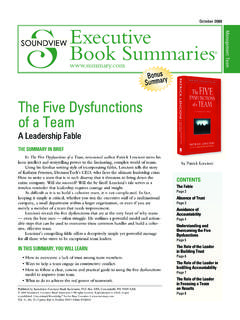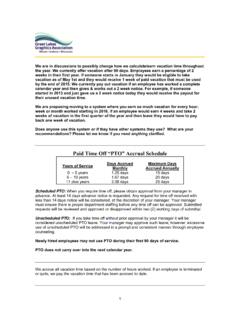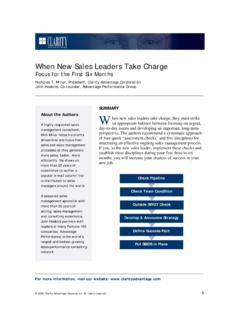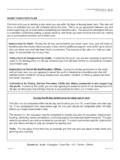Transcription of THE FIRST 90 DAYS Critical Success Strategies for New ...
1 THE FIRST 90 days Critical Success Strategies for New Leaders At All Levels By Michael Watkins Book Copyright 2003 by Michael Watkins. Summarized by permission of the publisher, Harvard Business School Publishing, 60 Harvard Way, Boston, MA 02163. 253 pages. $ ISBN 1-59139-110-5. Summary Copyright 2004 by Soundview Executive Book Summaries. , 800-521-1227, 610-558-9495. SUBJECT AREA: Success /CAREER TECHNIQUES CONTENTS 1. Promote Yourself 2. Accelerate Your Learning 3. Match Strategy to Situation 4.
2 Secure Early Wins 5. Negotiate Success 6. Achieve Alignment 7. Build Your Team 8. Create Coalitions THE SUMMARY IN BRIEF In The FIRST 90 days , Harvard Business School professor Michael Watkins presents a road map for taking charge in your FIRST 90 days in a management job. The FIRST days in a new position are Critical because small differences in your actions can have a huge impact on long-term results. Leaders at all levels are very vulnerable in their FIRST few months in a new job because they lack in-depth knowledge of the challenges they ll face and what it will take to succeed with their new company.
3 Failure to create momentum in the FIRST 90 days virtually guarantees an uphill battle for the rest of an executive s tenure. The FIRST 90 days will equip you with Strategies and tools to get up to speed faster and achieve more sooner. This summary will show you how to diagnose your situation and understand its challenges and opportunities. You ll also learn how to assess your own strengths and weaknesses, how to quickly establish priorities, and how to manage key relationships that will help you succeed.
4 What You ll Learn In This Summary How to promote yourself. Successful executives put the past behind them and get a running start by learning all they can about their new job. How to learn your new role faster. A leader must customize his or her approach by quickly learning about the organization s culture and politics. How to choose the right strategy. Selecting the best strategy for your company requires carefully diagnosing the business situation. Only after you ve analyzed the situation can you choose the right strategic plan that will get results.
5 How to make good things happen right away. You want your boss, peers and subordinates to feel that something new and good is happening. Early wins excite and energize people and build your credibility. How to build a winning team. Without a great team, you ll face severe difficulties because no leader can achieve ambitious goals on his or her own.~ THE COMPLETE SUMMARY 1. PROMOTE YOURSELF Promoting yourself doesn t mean self-serving behavior, grandstanding or hiring a PR firm to tell the world about you.
6 It means mentally preparing yourself to move into your new role by putting the past behind you and getting a running start by working hard to learn all you can about your new position. This takes a lot of effort, but it s essential that you do it. Many promising managers get promoted but don t do enough to change their perspective and successfully promote themselves. A similar mistake is to believe that you ll succeed in your new job by doing the same things you did in your previous job, only at a higher level of authority.
7 They put me in this new job because of my skills and accomplishments, the reasoning goes, so that must be what they expect me to do here. Doing what you know and avoiding what you don t know can seem to work, but there s a chance you ll keep on believing this until the walls come crashing down around you. Establish a Clear Breakpoint The move from one position to another usually happens so quickly it s all a blur. A worker rarely gets much notice before being thrust into a new job. The lucky new leader sometimes gets a couple of weeks to make the change, but more often the move happens in only a few days .
8 Because you might not get a smooth transition from one set of job responsibilities to another, it s essential to discipline yourself to make a smooth transition mentally. Pick a specific time, maybe a weekend, and use it to picture yourself being promoted. Consciously create mental images of letting go of the old job and embracing the new one. Think hard about the differences between the two positions and how you ll have to think and act differently in the new job. Take time to celebrate the move, even informally with family and friends.
9 Touch base with your advisers to ask for some quick advice. The bottom line: Do whatever it takes to get into a transition state of mind. Hit the Ground Running Your transition begins the moment you learn you re being considered for a new position, and it ends about 90 days after you begin the job. At the 90-day mark, key people in the organization your bosses, peers and direct reports expect you to be making an impact. The three-month time frame isn t written in stone the time depends on the type of situation you re in.
10 But for planning purposes, you should use the 90-day mark as an important milestone. It will help you realize that you ve got to get things done in that short time frame. If you re fortunate, you may get a month or more between the time you learn you re being considered and your FIRST day on the new job. Use that time to educate yourself about your organization. Assess Your Vulnerabilities You ve been offered your new position because the people who hired you think you ve got what it takes to succeed. You probably do.











